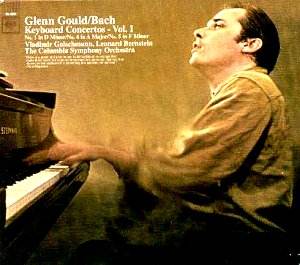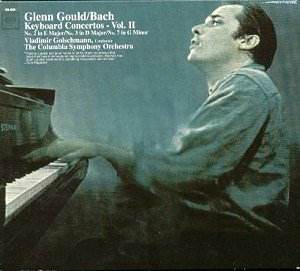Bach will always be the composer most associated with
Glenn Gould. Whereas with other composers – Mozart and Beethoven especially
though not exclusively – one often perceives those notorious Gouldisms
as deliberate affronts, either to hierarchy or to received opinion,
with Bach the occasional eccentricities seem, as it were, lit from within.
Not that these Concerto performances embody, except perhaps for moments
of détaché articulation and occasional hardness of tone,
much that will upset - much less outrage. The D minor was Gould’s most
performed concerto and he’d first played it in Toronto with Sir Ernest
MacMillan conducting in 1955, recording it two years later in New York
with the Columbia Symphony under Leonard Bernstein. In his notes – common
to both volumes of this concerto release in the Gould Anniversary Edition
– Michael Stegemann considers Gould’s unremittingly perplexing attitude
to the role of the soloist and his moral aversion to the genre ("I
don’t even approve of concertos morally"- and this at a time when
he was recording Beethoven concertos). Furthermore his increasing enthusiasm
for the recording and editing process added another layer of complexity
to Gould’s recording patterns; editing isn’t cheap and Gould took his
time.
In fact despite Gould’s protestations these are remarkably
convincing traversals. Bernstein directs a strongly etched performance
of the D minor, bringing characteristic weight to the strings and Gould’s
voicings are splendid. Golschmann by contrast is just that bit sturdier
(noticeable in his moulding of the allegro first movement of the A major)
but by contrast he is adept at unfolding, with unforced delicacy, the
Larghetto of the same work, lightening the string tone as he does so,
to which Gould responds with treasurable simplicity. They judge the
F minor equally well; the stern, gimlet-eyed drive of the Allegro –
with combustible little left hand fillips from Gould, is strongly contrasted
with the succeeding Largo and the almost transcendent limpidity the
musicians manage to evoke.
In the second volume it is all Gould-Golschmann. The
E major opens with sprightly and avuncular drive and the Siciliano is
very romantically orientated, with veiled string tone especially prominent.
The D major BWV 1054 is probably rather better known in its violinistic
guise; some very audible groans from Gould here, especially in the Adagio.
The little – relatively speaking – G minor, which concludes the set,
is again a strong and robust affair. Gould is really rather too forward
in the balance and his articulation might be thought once or twice too
brittle. But Golschmann’s strings once more clothe the line with a delectable
romanticism.
Each of the two CDs is in book format and each houses
performances that are lively, personalised and, more germane perhaps,
enjoyable.
Jonathan Woolf


![]() Glenn Gould (piano)
Glenn Gould (piano) ![]() SONY SMK87760 [48.20]
SONY SMK87760 [48.20]
![]() Glenn Gould (piano)
Glenn Gould (piano) ![]() SONY SMK87761 [49.05]
SONY SMK87761 [49.05]